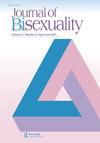性健康,还有什么?美国双性恋男性文学述评
IF 1.9
Q2 SOCIAL SCIENCES, INTERDISCIPLINARY
引用次数: 2
摘要
摘要尽管双性恋者的心理健康问题发生率高于女同性恋和男同性恋者,不安全性行为和药物使用率也更高(Feinstein&Dyar,2017;Gonzalez等人,2017;Green和Feinstein,2012),但尤其是双性恋男性,仍然是一个研究不足的群体(Feinstein和Dyar,17;Schrimshaw等人,2018)。这种健康差异与内在的双重恐惧症和对男性气概的担忧有关(Mackenzie,2019;Schrimshaw等人,2013年)。此外,有色人种双性恋男性经历了与种族和民族以及性取向有关的边缘化,这可能会对健康产生负面影响(Arnold等人,2017;Muñoz Laboy等人,2018)。利用谷歌学者、Pubmed和Psychinfo,在过去五年中发现了180篇包含双性恋男性术语变体的文章(详见方法)。不符合纳入标准的文章(例如,不完全关注双性恋男性,由非美国样本组成,或非实证)被过滤掉,最终样本中有33篇文章。通过对文章关键词的主题分析,对最后的文章进行了定性分析。在最终审查中包括的33篇文章中,当审查人员对主题进行解释时,这些主题在很大程度上符合少数群体压力的框架(Meyer,2003)。研究结果的两个主要类别包括双性恋男性的性健康和身份问题。在过去的五年里,只有十四篇文章关注性健康范围之外的经验方面。性健康仍然是双性恋男性研究的主要焦点。双性恋男性不仅仅是他们的性健康;了解他们的广泛经历将是有益的,包括面对耻辱时的弹性、关系和家庭动态,以及工作和其他方面的导航。本文章由计算机程序翻译,如有差异,请以英文原文为准。
Sexual Health, but What Else? A Critical Review of the Literature Focused on Bisexual Men in the United States
Abstract Although bisexual individuals have higher rates of mental health concerns than their lesbian and gay counterparts, and higher rates of unsafe sex practices and substance use (Feinstein & Dyar, 2017; Gonzalez et al., 2017; Green & Feinstein, 2012), bisexual men, in particular, remain an under-researched population (Feinstein & Dyar, 2017; Schrimshaw et al., 2018). Such health disparities have been tied to internalized biphobia and masculinity concerns (Mackenzie, 2019; Schrimshaw et al., 2013). Further, bisexual men of color experience marginalization related to race and ethnicity as well as sexual orientation, which can negatively impact health (Arnold et al., 2017; Muñoz-Laboy et al., 2018). Utilizing Google Scholar, Pubmed and Psychinfo, 180 articles that included variations of the terms bisexual men (see methods for details) were identified from the past five years. Articles that did not meet inclusion criteria (e.g. were not focused exclusively on bisexual men, comprised of non-U.S. samples, or were non-empirical) were filtered out, resulting in 33 articles in the final sample. The final articles were qualitatively analyzed through a thematic analysis of the article’s keywords. The 33 articles included in the final review included themes that largely fit into the framework of minority stress (Meyer, 2003) when interpreted thematically by the reviewers. The two main categories of the findings included sexual health and identity concerns for bisexual men. In the last five years, only fourteen articles were focused on aspects of experience outside of the scope of sexual health. Sexual health continues to be a primary focus of research with bisexual men. Bisexual men are more than their sexual health; it would be beneficial to know about a broad spectrum of their experiences, including resiliency in the face of stigma, relational and family dynamics, and navigation of work and other dimensions.
求助全文
通过发布文献求助,成功后即可免费获取论文全文。
去求助
来源期刊

Journal of Bisexuality
SOCIAL SCIENCES, INTERDISCIPLINARY-
CiteScore
2.60
自引率
17.60%
发文量
32
期刊介绍:
The Washington Quarterly (TWQ) is a journal of global affairs that analyzes strategic security challenges, changes, and their public policy implications. TWQ is published out of one of the world"s preeminent international policy institutions, the Center for Strategic and International Studies (CSIS), and addresses topics such as: •The U.S. role in the world •Emerging great powers: Europe, China, Russia, India, and Japan •Regional issues and flashpoints, particularly in the Middle East and Asia •Weapons of mass destruction proliferation and missile defenses •Global perspectives to reduce terrorism
 求助内容:
求助内容: 应助结果提醒方式:
应助结果提醒方式:


